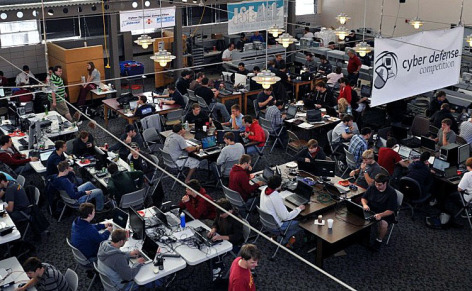
Iowa State students will compete in a 24-hour Money Game Jam, similar to this cyber defense competition on campus, but with a goal of teaching students about personal finance. (Larger photo) Photo by ISEAGE Cyber Defense Competitions
AMES, Iowa – Helping Iowa State University students plan for their financial future and manage their debt is no game, but taking such an approach may get more students engaged in the process. That’s the idea behind the “Money Game Jam” – a 24-hour competition in which participants will develop a new game, mobile application or website to get students involved in their personal finance.
Jonathan Fox, director of Iowa State’s Financial Counseling Clinic and Ruth Whipp Sherwin Professor in human development and family studies, says they are always looking for ways to reach students. The clinic offers online and traditional classes and has helped 5,000 ISU students this year through financial workshops.
Financial counselors know that when students come to the clinic for help, they feel less stress about their finances. Getting students to change one or two of their habits can improve their financial outlook. An app or game is just another way to encourage students to take that first step. Fox says it’s important to have students help with the design because they know best how to reach their peers.
“The whole idea is students helping students to develop a tool to improve financial literacy,” Fox said. “In a way we’d like to see students develop a concept that’s like the next ‘Angry Birds’ in terms of popularity, but ties to some level of personal finance awareness.”
Student entrepreneurs, designers and developers are encouraged to register for the competition. They can work individually or form a team to create an original game or app. Students will demonstrate their app for a group of judges that will rate it for creativity, appeal, technical feasibility and financial relevance to college students. Event organizers plan to develop the winning idea and make it available to Iowa State students this fall.
Charudut Shetty, a graduate student in computer science, is helping organize the Money Game Jam. He has participated in similar events and hackathons at other universities where students work throughout the night to complete the project in 24 to 48 hours. It’s an intense environment, but a way for students to showcase their talents.
“It’s a creative process,” Shetty said. “Students can use this as a platform to put forth their ideas and collaborate with other students. They generally team up at the venue and combine their skill sets to complete the project on time.”
Ongoing effort to reduce student debt
The game jam concept is part of a larger initiative to improve student financial education. Iowa State received a $40,000 grant from The Council of Graduate Schools to support those efforts, which include workshops and programs specifically for graduate students. In 2013, Iowa State’s Graduate College and the Office of Student Financial Aid surveyed graduate students about debt levels.
Craig Ogilvie, Graduate College assistant dean, was surprised to learn that 40 to 45 percent of U.S. graduate students at ISU take out a loan in a given semester, considering that many receive assistantships to finance their education. Those who do borrow, graduate with $25,000 to $32,000 in debt, depending on the level of their degree. Ogilvie wants to help graduate students, as well as undergrads considering graduate school, better manage their debt so it’s not a deterrent to completing their degree.
“Part of my motivation is to see if we can tackle student debt and find ways to encourage undergrad students to apply for graduate school without having to worry about debt,” Ogilvie said. “Many of the undergraduate students I work with do not know about graduate assistantships. There’s a real knowledge gap in this area and undergrad students need to have this as part of their education.”
The game or app developed during the game jam will be used to help all Iowa State students. According to a 2012 survey, nearly 40 percent of ISU undergraduate students did not know how much they had borrowed to finance their education.
In response, the Office of Student Financial Aid created the student loan repayment estimator. The average debt level for ISU graduates is just under $30,000. To better understand that amount, students can go online to get real-time updates on how much money they have borrowed and what it will cost each month to repay the debt.
“This puts it in very tangible terms for students,” said Roberta Johnson, financial aid director. “They know if they continue to borrow at this pace, they could be getting themselves into a situation that’s unmanageable.”
Iowa State also provides individual financial counseling for students considering private loan options to make sure they understand the terms and differences compared to a federal loan. Johnson says the efforts are paying off. During the 2008-09 school year, 71.2 percent of students who borrowed money graduated with debt. That number has since dropped nearly 10 percent to 61.8 percent for the 2012-13 report, Johnson said.
The hope is that the Money Game Jam will create one more tool to help students manage their finances. The competition will start at 11 a.m. on Saturday, March 29, at the Hixson-Lied Student Success Center. Students can win $1,000 for the top idea, which will be announced Sunday afternoon. A cash prize will also be awarded for second and third place. The event is sponsored by the Council for Graduate Schools, ISU’s Graduate College, Financial Counseling Clinic, Office of Student Financial Aid and Center for Excellence in Learning and Teaching.